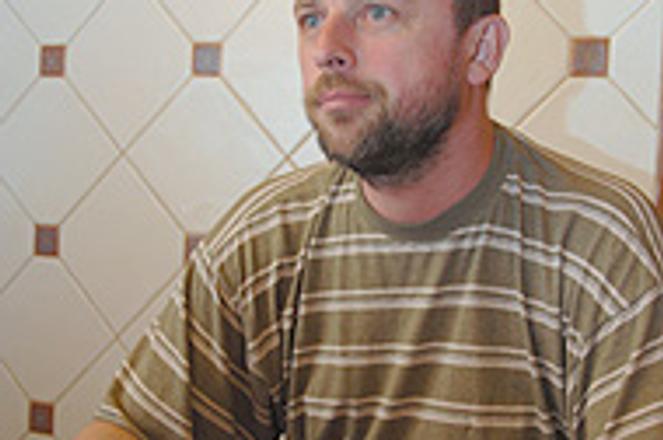Radek Schovánek of the Czech Interior Ministry's security archives.
photo: Jana Liptáková
FORMER Slovak prime minister Vladimír Mečiar was probably only a marginal contact for the communist secret police (ŠtB), said a researcher from the Czech Interior Ministry's security archives.
"He probably wasn't that interesting for them," Radek Schovánek told The Slovak Spectator. Schovánek worked at the Nation's Memory Institute in Bratislava on the re-construction of the two pages about Mečiar that were torn out from the secret police's archive.
"We used ŠtB files from the central index [in Prague] to restore the document," Schovánek said. However, he also confirmed that it was not possible to find out in which category the ŠtB had registered the current boss of the Movement for a Democratic Slovakia as "Mečiar's files have been destroyed". The ŠtB's friends and enemies were all closely watched and put into categories that described their relationship with the secret police.
Earlier this month, The Slovak Spectator reported that confidential ŠtB records on Mečiar and Jaroslav Svěchota, former vice-president of the Slovak Information Service (SIS), have been reconstructed, 17 years after the originals disappeared. The public has been hoping to learn the truth about Mečiar's relationship with the ŠtB ever since the first suspicions of his cooperation emerged in the early nineties.
The ŠtB's central index for all of Czechoslovakia was located at the secret police's statistics department in Prague and remained there even after the federation split and the Czech and Slovak republics were created.
"The register of files is a book where all the files ever created were recorded," Schovánek explained.
"If one knows the ID numbers of files one is looking for, it is possible to track them down through the central index and figure out the name of the person about whom the file was made." The central ŠtB index contains a number of books with exact records on people registered with the secret police.
"Partial restoration is possible," said Schovánek. "This is how we restored the two pages on Vladimír Mečiar." An independent commission was set up in the early nineties by the federal Interior Ministry to investigate people who had collaborated with the ŠtB. Based on their findings, Mečiar was a candidate for collaboration for one year but never became an agent, Milan Žitný, journalist, told The Slovak Spectator. Because of this he was not registered as a "conscious collaborator" with the totalitarian secret service. "He did not have to be," Žitný added.
Žitný was the commission's vice-chairman and worked on making a thorough examination of the activities of various citizens under the communist regime.
According to Žitný, eyewitness testimonies from as early as 1990-1992 suggest that Ivan Horňák, an ŠtB captain, registered Mečiar as a candidate for collaboration in 1985. But since Horňák was a friend of Mečiar's, had a cottage next to his and was said to have helped Mečiar re-build his cottage, Horňák's superior opposed Mečiar's registration, Žitný said.
The whole western-Slovak Poruba region was aware that Mečiar had befriended an ŠtB officer and so there would have been a threat of ŠtB activities being revealed, said Žitný.
Mečiar was registered for one year as a candidate for collaboration with the secret police and there was even a file opened on him. However, after one year, the file was closed as no more records had been added, said Žitný.
Ivan Horňák has refused to communicate with the media.
Žitný discovered that Mečiar's file was lost from the ŠtB's 7th Division, their Slovak headquarters located in Bratislava, sometime between March and July 1990 - the same time that Mečiar was Interior Minister.
The fact that Mečiar was registered as a candidate for cooperation has been known since the spring of 1990 and the media has written dozens of pages about it since then, Schovánek said.
"But the category Mečiar was put in by the ŠtB cannot be determined definitely from the index that we used to restore the pages," he added.
In February 1992, Mečiar himself admitted that the ŠtB had asked him to report on Alexander Dubček, a Slovak politician who was one of the forces behind the Prague Spring, the brief liberalisation of the communist regime in 1968.
Mečiar told the press that when Dubček was feeling political pressure, he asked three of the people whom the ŠtB had pressed to cooperate to comply and give the secret police edited and pre-arranged information.
Dubček allegedly arranged "what they should tell the ŠtB agents, so that it sounded plausible and thus create a cover for his other activities," Mečiar was quoted as saying by Marián Leško in his book Mečiar a Mečiarizmus.
Dubček denied Mečiar's claims.
As for the loss of the documents, Schovánek explained that the lost files can still be restored using other documents found in the ŠtB archives.
"Most of the ŠtB documents had copies made," he said. "Although not everything can be restored, a considerable part can."
Moreover, ŠtB agents sent daily reports by telegraph to the headquarters from their regional and district sections.
"If you take Trenčín, where Mečiar was operating, and if you take the telegraphs, sent maybe daily, it is probable that you find something about him, but you would have to search thoroughly through a hundred thousand pages," Schovánek said.

